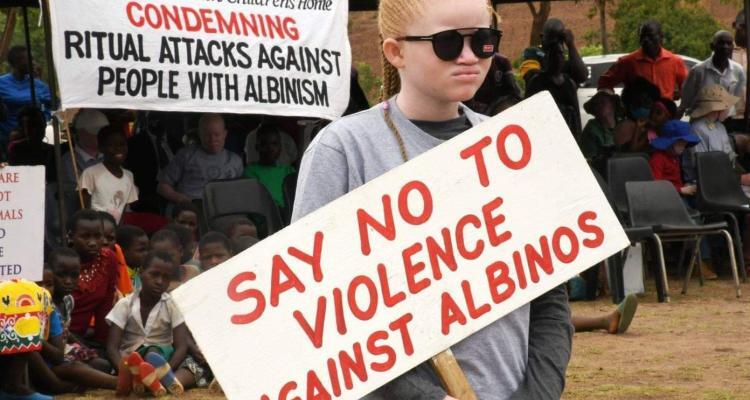
As the commemorative decade of the United Nations resolution establishing the independent expert on the rights of persons with albinism approaches, it is pertinent to review the progress made. It is important to draw attention to the gaps and limitations in the existing approach to ending attacks and other violations targeting persons with albinism. The UN deserves commendation for the resolution and the appointment of an independent expert on the rights of people with albinism in 2015. This step signifies a demonstration of political will and commitment to ending stigma, discrimination, and violence against people with albinism. It shows that the world can rally together against a common threat to human well-being.
However, having attended meetings and conferences in Geneva and recently in Lancaster, where stakeholders from across the world discussed ways to address this problem, I have noticed some missing links in the approach. I worry that if these limitations are not addressed, the resolution will not achieve its desired goals. At these meetings, campaigners highlighted pertinent aspects of the problem. They explained misconceptions about albinism, noting that it is a non-contagious, genetically inherited condition that affects people regardless of race, ethnicity, gender, religion, or belief.
Campaigners also highlighted the health risks that people with albinism face, including deadly skin cancer. They provided statistics on attacks and killings of people with albinism in various countries, primarily in African nations like Tanzania and Malawi. They shared graphic images of victims and survivors, along with the costs of body parts of people living with albinism. Campaigners outlined efforts by state and non-state agencies to address the problem, such as arresting and prosecuting attackers and providing sunglasses and other medical supplies. However, that is often where the discussions end.
From my observations, the approach to ending abuses of people living with albinism is Eurocentric and fundamentally flawed. This imbalance is undermining the campaign. Unless efforts are made to rectify this, I submit that the resolution’s objectives will not be realized, and the attacks and killings will continue.
Why do I say this?
At all the events I have attended, campaigners stressed the importance of not referring to people living with albinism as “albinos.” They argued that the term is derogatory and reduces individuals to nothing more than their skin condition. While I agree that derogatory terms should not be used, I question how relevant this focus is in rural African communities, where most of the killings and attacks occur. How many people in these communities speak English? How many Africans even know the term “albino” or are aware of the distinction between “albino” and “person with albinism”? In many African countries, local names are used to describe people with albinism, not English terms.
For example, in Nigeria, people with albinism are often called “Oyibo,” meaning white person, or referred to by derogatory slang terms. While it is crucial to discourage the use of demeaning language in any language, is the terminology really the main issue here? Of course not.
The real problem lies in the misconceptions about the bodies of people with albinism. Similar misconceptions exist about people with hunchbacks or bald heads in some regions. Unless these misconceptions are dispelled, campaigns against attacks and violations targeting people with albinism are superficial. They are merely papering over the issue.
At the meetings I attended, speakers did a good job of describing the situation and explaining how beliefs about the skin of people with albinism motivate attacks. Yet something was missing: they did not take a clear position on these beliefs. They failed to directly challenge them as mistaken ideas. These conferences lacked the necessary leadership and guidance. When confronted, some presenters excused themselves, saying they were researchers, not activists. But some of these individuals were from affected regions. How does being a researcher prevent one from taking a stance on this issue?
Others, particularly those from Europe or America, expressed concerns about being accused of racism or neocolonialism. They didn’t want to impose their ideas on Africans. But this raises the question: Why get involved if you’re not prepared to lead or offer guidance? Why spend time and resources on conferences if you’re unwilling to take a public stance?
During the pandemic, the World Health Organization didn’t merely describe misconceptions about COVID-19. It issued statements, dispelled misinformation, and provided leadership to people, governments, and institutions. The UN and other campaigners should do the same in the case of albinism. They must address the root of the problem and stop papering over the issue. Campaigners should treat the killing of people with albinism with the urgency it deserves. They should not withhold any information or position that could help the cause.
The UN and other agencies should allocate significant resources to public education, not to organizing repetitive conferences. They need to lead public enlightenment campaigns that correct the misconceptions about the skin and body parts of people with albinism.
The UN and other stakeholders must supply the missing link in this campaign—the informational and conceptual foundation. They should unequivocally state that the belief that sacrificing the skin or body parts of people with albinism brings luck, wealth, or success is a baseless superstition that must be discarded. Campaigners must take this message to the communities and countries where attacks and killings take place, without hesitation.
Advocates, scholars, and activists in Africa must assist the UN and other international bodies in supplying this missing link. They must ensure more robust campaigns and effective outcomes in the next decade of this resolution.
Leo Igwe directs the Advocacy for Alleged Witches, which campaigns to end abuses linked to witchcraft beliefs and ritual attacks in Africa.














